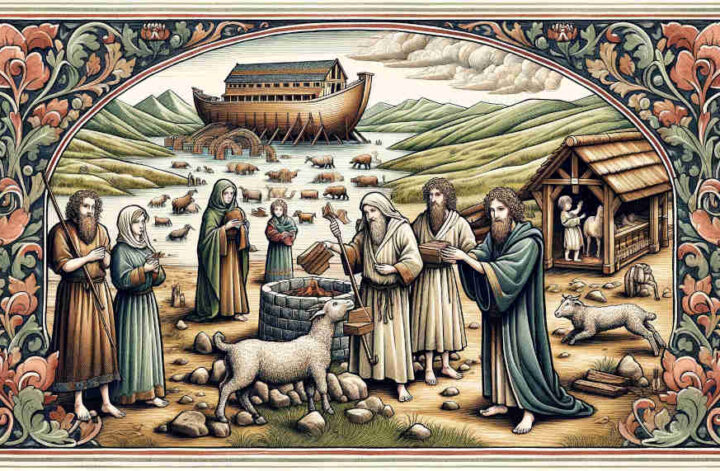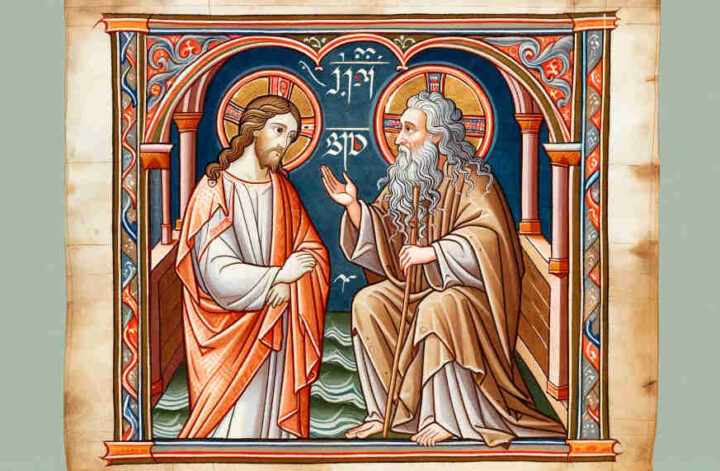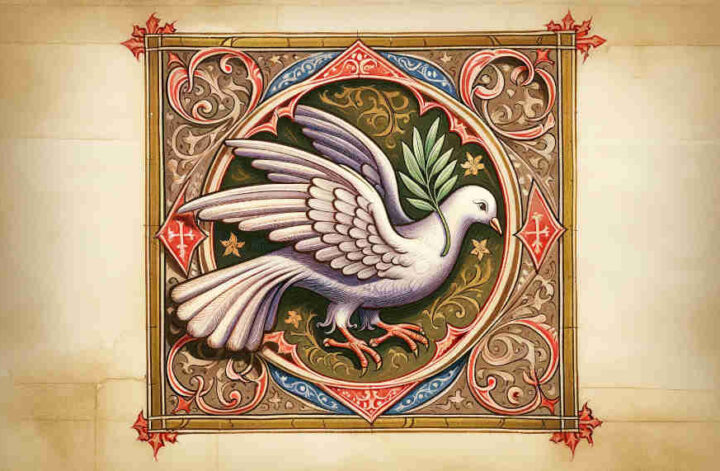Here’s a set of Noahide prayers for every day, thoughtfully curated for those seeking spiritual guidance along the Noahide path. This collection encompasses prayers for various times of the day — morning, afternoon, evening — and includes blessings for different occasions. From blessings before meals to Psalms for praise and thanksgiving, and personal prayers for specific needs, these prayers are designed to enrich your daily spiritual practice, connecting you deeper with the Divine and the enduring principles of the Noahide faith.
Noahide Morning Prayers
Awakening Prayer
“Blessed are You, O Lord, who returns my soul to me with compassion. Your faithfulness is boundless. Each morning, Your mercy renews, a testament to Your unending love. As I awaken to the dawn, let my first thoughts be of gratitude and awe for the gift of life You have bestowed upon me.”
The Awakening Prayer is intended to be recited upon rising in the morning. This moment, when the mind transitions from sleep to wakefulness, is an opportunity for spiritual renewal. As you open your eyes, take a few quiet moments to acknowledge the gift of a new day. This prayer is a means to express gratitude for life and the renewal of your soul, recognizing the enduring faithfulness and compassion of the Creator. It sets a tone of mindfulness and appreciation, helping to start the day with a positive and reflective mindset.
Morning Blessings
“Blessed are You, O Lord, for giving the heart understanding to distinguish day from night, guiding us through the cycles of time, a reflection of Your eternal presence.”
“Blessed are You, O Lord, for opening the eyes of the blind, illuminating the world in its splendor, revealing the wonders of Your creation.”
“Blessed are You, O Lord, for clothing the naked, providing for our needs with Your boundless generosity, a symbol of Your protective care.”
“Blessed are You, O Lord, for freeing the captive, liberating our spirits from the bonds of despair, and leading us towards the path of hope and redemption.”
“Blessed are You, O Lord, who guides our steps, leading us on the journey of life, illuminating our path with the light of Your wisdom.”
The Morning Blessings are designed to be recited as part of your morning routine, ideally after the Awakening Prayer. These blessings are an expression of gratitude for the daily miracles that often go unnoticed. Each blessing focuses on a specific aspect of God’s benevolence, encouraging mindfulness about the many ways in which God’s presence manifests in our lives. Recite these blessings as you prepare for your day, reflecting on their meaning and how they relate to your experiences. This practice helps cultivate a mindset of gratitude and recognition of the Divine in every aspect of daily life.
Noahide Afternoon Prayers
Midday Reflection:
“O God, Eternal and All-knowing, as the sun journeys across the sky, let Your light illuminate my heart and soul. Grant me serenity and peace within, that I may stand firm in the face of life’s trials. Guide my actions to be a reflection of Your goodness and unwavering truth. As the day unfolds, nurture in me a spirit of understanding and compassion, and guide my choices to honor Your teachings. May my words and deeds bring light to the world, embodying the principles of Your wisdom and love.”
The Afternoon Prayer, or Midday Reflection, is designed to be a moment of spiritual pause in the midst of a busy day. Ideally, it should be recited in the afternoon, when the day’s activities are at their peak. This timing allows for a mindful break, a chance to recenter oneself in the midst of daily responsibilities. Find a quiet moment and space to reflect on the prayer’s words. It’s an opportunity to assess your actions of the day, align your intentions with spiritual values, and rejuvenate your commitment to living a life reflective of God’s teachings. This prayer serves as a bridge, connecting the morning’s aspirations with the evening’s reflections.
Noahide Evening Prayers
The Evening Prayers in the Noahide tradition, comprising the Evening Thanksgiving and the Bedtime Prayer, are meant to be recited as the day comes to a close.
Evening Thanksgiving
“O Lord, as the day closes, I thank You for all its moments—the joys and challenges. Each experience is a lesson in Your grand design, teaching me resilience, compassion, and understanding. May my gratitude for today inspire hope for tomorrow.”
The Evening Thanksgiving prayer is ideal for reflecting on the events of the day, acknowledging both the joys and challenges faced. It’s a time to express gratitude for the lessons learned and the resilience gained. This prayer is best recited in a quiet moment of the evening, perhaps as part of winding down activities, allowing for introspection and thanksgiving.
Bedtime Prayer
“Heavenly Father, under Your protection, I lay down to rest. Bring peace to my mind, calmness to my heart, and rejuvenation to my body. As I sleep, guard me from fear and doubt, and let me awaken to a new day filled with Your grace.”
The Bedtime Prayer is designed for the moments just before sleep. It’s a prayer seeking divine protection and peace through the night. As you prepare to sleep, recite this prayer to calm your mind and heart, inviting a restful and rejuvenating sleep under God’s care, and preparing to awake to a new day graced by God’s presence.
These prayers in the evening allow for reflection on the day’s events and seek divine protection and peace for the night. They remind us to end our day with a heart full of gratitude and trust in God’s providence.
Noahide Prayers Before Meals
The Noahide Prayers Before Meals should be recited just before consuming food, as a way to pause and express gratitude for the nourishment provided. The Prayer for Bread is said before eating bread, recognizing the transformation of simple grains into sustenance. The Prayer for Wine is recited before drinking wine, reflecting on the growth and renewal it symbolizes. The Prayer for Food is for all other meals, acknowledging the divine process behind each morsel. These moments of thanksgiving deepen our appreciation for God’s provision and the natural world.
Prayer for Bread
“Blessed are You, O Lord, our God, King of the universe, who brings forth bread from the earth. In Your wisdom, You have provided for us, transforming simple grains into sustenance. As we partake of this bread, let us remember the bounties of Your creation, and the countless hands that brought this nourishment from field to table.”
Prayer for Wine
“Blessed are You, O Lord, our God, King of the universe, who creates the fruit of the vine. In the sweetness of this wine, we taste the richness of Your blessings. As we drink, let us reflect on the cycle of growth and renewal, a testament to Your unending grace in the natural world.”
Prayer for Food
“Blessed are You, O Lord, our God, King of the universe, by whose word everything comes into being. Every morsel we eat is a gift from Your hand, a reminder of Your constant care. May this meal nourish our bodies and souls, and inspire us to share Your generosity with others.”
These prayers before meals are an expression of profound gratitude, recognizing God’s hand in providing sustenance. They are an invitation to pause and appreciate not only the food but also the divine process behind its existence.
Prayers of Praise and Thanksgiving
In moments when our hearts overflow with gratitude or the desire to praise, the timeless words of the Psalms offer a perfect conduit for our expressions. We have selected three Psalms that resonate deeply with these feelings:
Psalm 100: This Psalm is an invitation to joyfully acknowledge God’s enduring kindness. It is perfect for expressing heartfelt thanks and recognizing the endless blessings in our lives.
Psalm 150: A vibrant call to praise God with all forms of expression, this Psalm celebrates His mighty acts and boundless greatness. It encourages us to use every means at our disposal to glorify God.
Psalm 23: A Psalm of deep comfort and trust, it speaks of God’s guiding hand and His providential care. It is a reminder of the peace and security found under God’s watchful eye.
These Psalms can be recited or contemplated upon whenever you feel moved to connect with God through gratitude and praise. They are a bridge to the Divine, carrying the weight of history and the purity of personal devotion.
Personal Prayers for Various Occasions
In the journey of life, personal prayers offer a direct line of communication with the Divine. Whether seeking solace, expressing gratitude, or requesting guidance, these prayers are crafted to resonate with the heart’s deepest desires and needs.
Prayer for Health
“Heavenly Father, Healer of all flesh, please grant strength and recovery to those in need. Bless those who care for the sick, and rejuvenate our bodies and souls with Your healing spirit.”
Prayer for Family
“God of our ancestors, bless our family with unity, peace, and prosperity. May Your love and guidance be the foundation of our home.”
Prayer for Wisdom
“Grant me, O God of wisdom, the discernment to understand Your ways. Illuminate my path with insight, and guide my decisions with Your eternal wisdom.”
Prayer for Prosperity
“Almighty God, You are the provider of all. Bless my endeavors with success. May my efforts bear fruit and contribute to the well-being of Your creation, following Your commandments of generosity and stewardship.”
Prayer for Protection
“God, my Protector, shield me from harm. In uncertain times, be my refuge and guide me with Your steadfast love.”
Prayer for Peace
“O Lord, our God, King of the Universe, You are the source of peace. Spread Your tranquility over us and the world. Heal the divisions among Your people and inspire us to build a world of harmony and understanding under Your guidance.”
Prayer for Gratitude
“Lord, for the countless blessings You bestow, I offer my heartfelt thanks. Help me always recognize the abundance of Your gifts.”
Prayer for Forgiveness
“Merciful God, forgive my missteps. Grant me the strength to forgive others and guide us on the path of kindness and compassion.”
Prayer for Guidance
“God, my Guide, lead me on Your righteous path. Illuminate my way with Your wisdom and truth.”
Prayer for Community
“Our Father in Heaven, You are the Creator of all. Bless our community with unity, strength, and purpose. Guide us to uplift each other and contribute positively to Your world, fulfilling Your commandments of love and communal responsibility.”
These prayers, tailored for specific aspects of life, serve as a spiritual compass. They encapsulate the essence of the Noahide tradition, offering a framework for personal reflection and a deeper connection with God.
Concluding Thoughts
As we reach the conclusion of this Noahide Prayer Book, remember that prayer is much more than a series of words or rituals. It is the heartbeat of a spiritual journey, a profound dialogue with the Divine. These prayers are designed to deepen your connection with the Creator, guiding you to live a life of purpose and integrity within the Noahide tradition. May your dedication to these prayers enrich your life, drawing you closer to spiritual fulfillment and divine wisdom. Walk this path with reverence and openness, and let the light of these teachings illuminate your way. Shalom.


